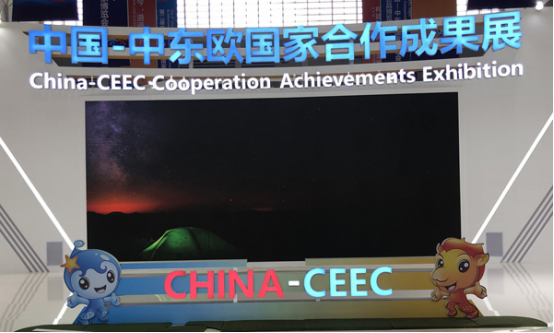Veteran Chinese envoy heads CEEC visit, to clarify misunderstanding over Ukraine

China-CEEC cooperation. Photo: Chu Daye/GT
A Chinese delegation led by a veteran diplomat will visit eight Central and Eastern European Countries (CEEC) this week. Analysts said that the trip aims to further promote cooperation as this year marks the 10th anniversary of the China-CEEC mechanism, and to dismiss misunderstandings, especially over China's stance on the Ukraine crisis.
Wang Lutong, director-general of the Department of European Affairs of the Foreign Ministry, tweeted on Monday that Ambassador Huo Yuzhen, the special representative for China-CEEC Cooperation, is visiting Europe. "Her delegation will visit the Czech Republic, Slovakia, Hungary, Croatia, Slovenia, Estonia, Latvia and Poland."
Huo was ambassador to the Czech Republic from 2006 to 2010, and Romania from 2011 to 2015. The Global Times learned that Chinese think tank scholars and entrepreneurs also attended the delegation.
Against the COVID-19 pandemic and the Ukraine crisis, the delegation will overcome great difficulties and have candid and direct communication with European friends, after misunderstandings have grown due to decreasing people-to-people exchanges. And deeply influenced by the US, some CEEC countries also bear a bias on China, especially China's 's stance on the Ukraine crisis, Liu Zuokui, a research fellow on European studies at the Chinese Academy of Social Sciences (CASS), who also leads the delegates of think tanks, told the Global Times on Tuesday.
"Pragmatic cooperation" is a key phrase for the visits to these countries. Liu said entrepreneurs are scheduled to discuss concrete projects with local enterprises, promoting the Belt and Road Initiative cooperation through a series of projects and promoting bilateral cooperation.
It has been 10 years since the setting up of the China-CEEC cooperation mechanism. Despite the achievements, there are also problems that need to be dealt with and some CEEC countries also have new expectations for future cooperation, like having more exchanges on high technology, Cui Hongjian, director of the Department of European Studies at the China Institute of International Studies, told the Global Times.
In the past decade, China and CEEC members have strengthened ties in various aspects, from trade and investment to tourism and culture. Since the China-CEEC cooperation mechanism was set up in 2012, trade between China and CEEC members increased 85 percent, with an 8 percent annual growth, which was more than three times the growth rate of China's overall trade, and more than double China's trade growth with the EU.
However, in recent years, some politicians in CEEC countries have been keen on hyping topics to interfere with China's internal affairs, like playing the Taiwan card to cater to the US, which severely undermined the basis for bilateral cooperation, analysts said, noting China's downgrading of diplomatic relations with Lithuania to the level of chargé d'affaires in November 2021 after the latter repeatedly challenged the one-China principle.
Cui noted that there is increasing anti-Russia sentiment in some CEEC countries. As the US is working hard to smear China's independent stance over Ukraine and to portray China and Russia as evil allies, these countries may have more misunderstandings of China. Against such a background, the Chinese delegation will explain China's stance, refute disinformation and clarify misunderstandings.
Liu said that deeply influenced by the US, some CEEC countries consider condemning Russia as "politically correct," and they see China's stance on Ukraine very emotionally and such emotion has spilled over to bilateral cooperation. China's pragmatic cooperation with CEEC has been affected by geopolitics and emotions fanned by the US, which should be paid attention to and dealt with calmly.
Since February, many CEEC countries have criticized Russia over its conflict with Ukraine, with some taking actions like closing their airspace to Russian planes, following the EU to sanction Russia or suspending licenses to Russian media. Some countries like Serbia and Hungary have been under pressure for having independent stances over the issue.
Analysts said that the Ukraine crisis has worsened the security situation in the region, and economies in Ukraine's neighboring countries, including Poland, Hungry, Slovakia, will be affected and foreign investment in CEEC countries may shrink due to increasing risks. They noted that amid the rising concerns, the success of some projects under the China-proposed Belt and Road Initiative have drawn attention.
The latest milestone was in Serbia on March 19, where an inauguration ceremony was held for the Belgrade-Novi Sad section of the Belgrade-Budapest railway - a flagship project designed to demonstrate cooperation between China and the CEEC. The railway is an important project for the European transportation corridor as well as for China-Europe land-sea supply chains.
Liu said that all the divergences and difficulties between China and CEEC cannot be settled in one day. "We come to these countries - this is a way to show our friendly attitude for better relations and win-win cooperation," said Liu, calling for CEEC to work with China toward the same goal.
